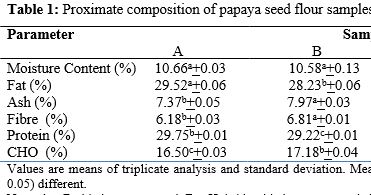Evaluation of the Quality and Physicochemical Properties of Carica Papaya Seed Flour from Different Cultivars
DOI:
https://doi.org/10.54117/ijnfs.v3i4.68Keywords:
Papaya, Physicochemical, Seed Flour, Nutritional and PharmaceuticalAbstract
This study evaluated the physicochemical and food quality properties of three varieties of papaya seed flour from fresh, whole, mature, ripe and edible papaya fruits. The varieties include elongated papaya seed, elongated red papaya seed and round papaya seed. The papaya seed samples were processed into flour and then analyzed for proximate, vitamin, minerals and functional properties using standard analytical procedures. The result of the proximate composition showed; moisture (10.58-10.75%), protein (29.22-30.30%), fat (28.23-29.52%), ash (7.14-7.99%), fibre (5.99-6.81%) and carbohydrate(16.50-17.54%) respectively. The vitamin content of the pawpaw seed flour samples was found to be in the ranges of 38.62– 43.24 µg/100g for vit. A, 0.13– 0.23mg/100g for vit. B1, 0.37– 0.52mg/100g for vit. B2 and 2.01–2.44mg/100g for vit. C, while the mineral contents vary from 1.89–2.69mg/100g(zinc), 51.63–53.23mg/100 (potassium), and 3.25–4.51mg/100g. These pawpaw varieties differ significantly (P < 0.05) in proximate, vitamin and mineral composition. The functional properties revealed; bulk density (30.71-33.74%), water absorption capacity (210.63-213.53%), oil absorption capacity (224.69–240.18%) and foaming capacity (6.91-9.52%). These findings underscore the potential for papaya seed flour in various industrial, nutritional, and pharmaceutical applications. Therefore, this research highlights the nutritional, pharmaceutical, functional, and economic importance of papaya seed flour.

Downloads
Published
How to Cite
Issue
Section
License
Copyright (c) 2024 Austin Ihemeje, Odinakachi Theresa Okoronkwo

This work is licensed under a Creative Commons Attribution 4.0 International License.
